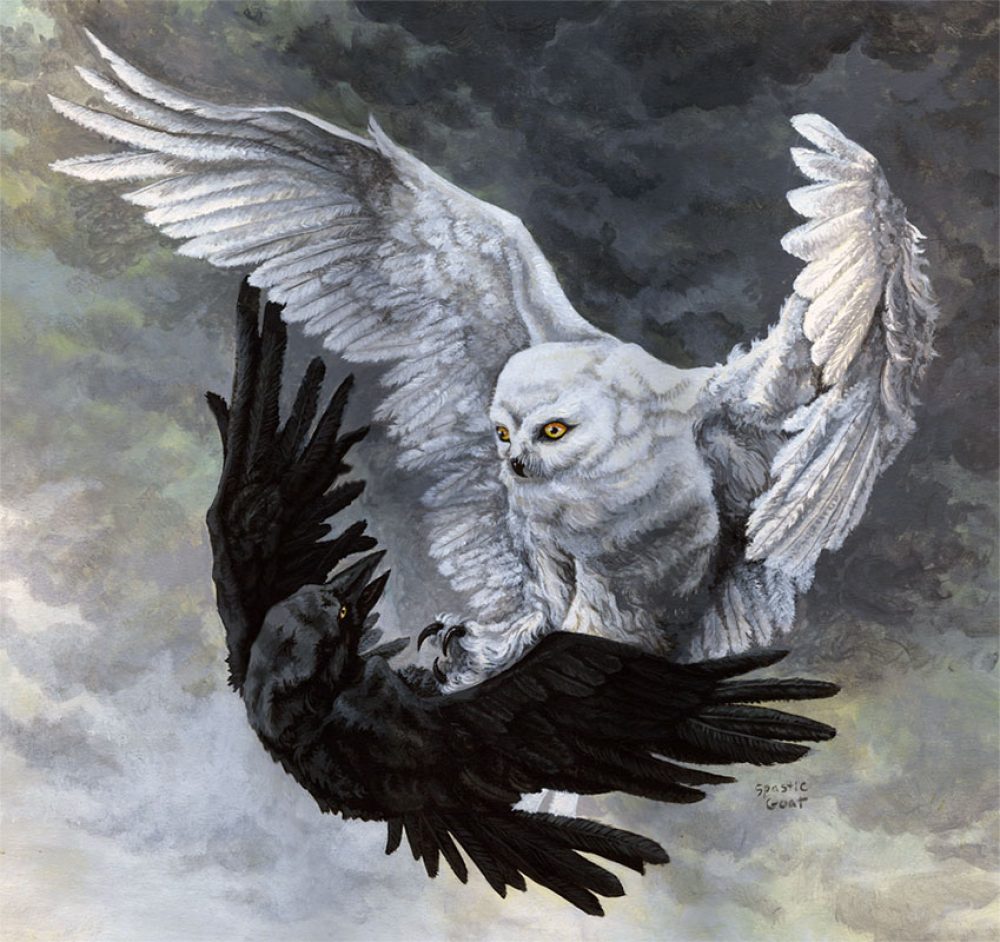न विश्वसेत् पूर्व-विरोधितस्य शत्रोश् च मित्रत्वम् उपागतस्य ।
दग्धां गुहां पश्य उलूक-पूर्णां काक-प्रणीतेन हुताशनेन ॥ १ ॥
na viśvaset pūrva-virodhitasya śatroś ca mitratvam upāgatasya |
dagdhāṃ guhāṃ paśya ulūka-pūrṇāṃ kāka-praṇītena hutāśanena || 1 ||
One should not trust a person who has been an enemy before, but now offers the hand of friendship. Look at the cave, that was once the house of all the owls, now burnt due to the fire that the crow set to it…

There was a city not so far away from here, and was called Mahilāropya (a maiden’s delight). A huge fig tree existed on it’s outskirts, with a large number of branches and dense foliage. The king of crows MeghaVarna (coloured like a dark cloud) lived there with his subjects. He had ordered the construction of a huge fort on that tree, and lived with his tribe there, and passed his days joyfully.
Inside a fort not so far away from the tree, lived AriMardana (the vanquisher of enemies), the king of owls. He and his subjects lived a secure cave inside a hill within the fort.
As night fell, AriMardana made short trips outside the fort, and inevitably ended up flying near the fig tree. He was a natural enemy of the crows, and so whenever he spotted a crow outside, he took very little time in killing it, and then fled from the scene. This happened every night, and within a few months, the population of crows on the fig tree dwindled to to a large extent. No wonder that it is said…
य उपेक्षेत शत्रुं स्वं प्रसरन्तं यदृच्छया ।
रोगं चालस्य-संयुक्तः स शनैस् तेन हन्यते ॥ २ ॥
ya upekṣeta śatruṃ svaṃ prasarantaṃ yadṛcchayā |
rogaṃ cālasya-saṃyuktaḥ sa śanais tena hanyate || 2 ||
He who, due to sheer laziness, disregards an enemy, or a disease, even when it increases it’s presence beyond control, gets killed by them, slowly, but surely.
And also…
जात-मात्रं न यः शत्रुं व्याधिं च प्रशमं नयेत् ।
महाबलो ऽपि तेनैव वृद्धिं प्राप्य स हन्यते ॥ ३ ॥
jāta-mātraṃ na yaḥ śatruṃ vyādhiṃ ca praśamaṃ nayet |
mahābalo ‘pi tenaiva vṛddhiṃ prāpya sa hanyate || 3 ||
He who does not nip in the bud, an enemy or a disease that makes an appearance, gets killed by them even if he is strong in body and mind.
This indiscriminate killing of crows troubled MeghaVarna so much that he had to declare an emergency and call an urgent meeting of his council of ministers.
As they settled down around him in his court, MeghaVarna acknowledged them first, and then addressed them grimly “My dear ministers, our enemy is very powerful, and cunning. He cleverly attacks us at night, when we cannot see, and we do not know where he comes from, and so we are unable to counter-attack during the day. And so, we need a solution, and we need it now.”
“According to Manusmiriti, there are six policies of dealing with such an issue – Sandhi (peace treaty), Vigraha (war), Yaana (preparation for war), Asana (neutrality), Samsraya (forming alliances) and Dvaidhibhava (double-dealing or pretending to be friendly). So please discuss among yourselves and let us reach a consensus on how we are going to tackle this situation.”
to be continued…
After tackling how rifts between friends are created, and how to make and keep friends, Vishnu Sharma now speaks about politics.
People are complicated beings. You may be the friendliest person on earth, yet there are some people who will dislike you, no matter what. Some people have a reason to dislike you, others don’t. And so it is a given that everyone has enemies, or people who strongly disagree with them.
In the context of nations, this becomes more complex. Here it is not about individual enmities or preferences – leaders have to take everyone’s views as a consolidated view of a nation. When one nation has enmity with another, there are many nuances to such an enmity. One cannot always take up arms and fight to the finish – that would not lead anywhere. And this is where politics comes in.
The third book of the Panchatantra deals with the natural enmity between crows and owls. Crows are day creatures, while owls operate at night. The stark contrast in their basic natures leads to an enmity, and in due course the owls start to attack the crows when they are most vulnerable – at night. In this situation, MeghaVarna is faced with a tough task – saving his people, and deciding how do go about it. Direct war is not possible, since the crows don’t even know where the owls live. And so some other method would have to be employed here.
What follows are deliberations in the courts of both MeghaVarna and AriMardana, where ministers from both sides argue and debate on the possible courses of action. Five different methods are considered on both sides. One minister from MeghaVarna is proved right, and one from AriMardana is also proved right.
But which one? You will just have to wait to find out!
